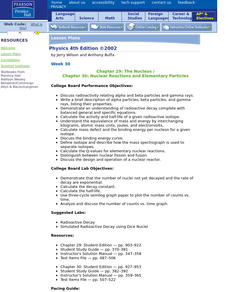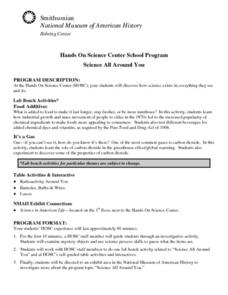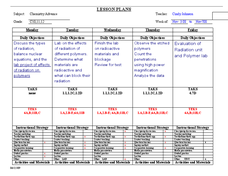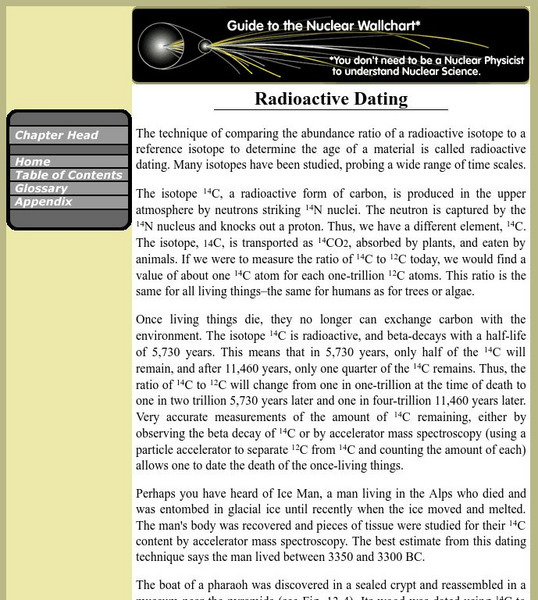Curated OER
The Nucleus / Nuclear Reactions and Elementary Particles
Students describe how radioactivity relates to alpha and beta particles. Using their properties, they write a descriptive paper about the gamma rays and alpha and beta particles. They calculate q-values and the half-life of a given...
Curated OER
Watershed Investigations
Students find maps of the region to show rock formations and soil types and use GIS to compare radon levels. They describe three types of radioactive decay, interpret graphs, and follow steps to develop a nuclear bomb or energy.
Curated OER
Simulation of Irradiation
In this irradiation worksheet, students simulate the effects of irradiation on bacteria growth by using UV light. Then students complete 6 short answer questions.
Curated OER
What is the Rock Cycle?
Students investigate the rock cycle. In this geology lesson, students read about the rock cycle on a website and discuss the steps of the rock cycle. Students visit a rock cycle website to complete a quiz. This is the first introductory...
Curated OER
Chemistry Midterm Topic Review
In this chemistry review worksheet, students answer and solve 95 questions about chemical reactions, hydrocarbons, functional groups, moles, acids and bases and solutions.
Curated OER
Simulating the Greenhouse Effect in a Terrarium
Students identify what factors effect global warming and how the greenhouse effect occurs. In this environmental lesson students view videos then complete an experiment using a terrarium to observe greenhouse gas.
Curated OER
Primary Energy Sources Pros and Cons
Students explore the different types of renewable and nonrenewable energy sources. In this earth science lesson, students discuss the pros and cons of each type. They conduct a variety of experiments on renewable energy.
Curated OER
AP Biology Lesson Outline
Ninth graders research the different field of bioengineering. In this biology lesson, 9th graders differentiate meiosis and mitosis. They discuss the pros and cons of using radiation in medical diagnostics.
Curated OER
AP Biology Lesson Outline
Twelfth graders research about the different careers in bioengineering. For this biology lesson, 12th graders identify the different stages in the cell cycle. They discuss the pros and cons of using radiation.
Curated OER
DNA Sequencing Simulation
Young scholars simulate the Sanger method of DNA sequencing using color pop-beads as a representation of nucleotides and dideoxynucleotides. Students assemble DNA sequences and run their sequences through a "sequencing gel" and sketch...
Curated OER
Science All Around You
Students visit and explore a Hands On Science Center (HOSC). They participate in a variety of self-guided table exercises and observe as scientists demonstrate various scientific principles.
Curated OER
Radiation In Our World
Students identify the different sources of radiation around us. In this physics lesson plan, students calculate their estimated radiation exposure per year. They research a current issue about radiation.
Curated OER
Nuclear Chemistry
Students write and balance nuclear equations. In this chemistry lesson, students identify materials that block radiation using polymers. They collect and analyze data from the experiment.
Lawrence Berkeley National Laboratory
Berkeley Lab: Neutron Activation Analysis
A simple explanation of neutron activation of some natural elements in order to create a radioactive nucleus.
Physics Aviary
Physics Aviary: Radiation Detection Lab
This lab is designed to allow students to look at the amount of radiation that is detected at different distances from a radioactive source.
Utah Education Network
Uen: Penny Half Life Lab
Students will use pennies to model the half-life of radioactive atoms.
Physics Aviary
Physics Aviary: Half Life Lab
This lab is designed to allow students to look at the amount of radiation that is detected at different times from a radioactive source with a very short half-life. This video will help with the lab:...
Physics Aviary
Physics Aviary: Radioactive Shielding Lab
This lab is designed to allow students to look at the factors that affect the amount of radiation that is absorbed by different shielding materials.
Florida State University
Florida State University: Magnet Lab: Lanthanum Aluminate
An explanation of this unique ceramic, including why it is of such great interest to scientists. Researchers use lanthanum aluminate to grow thin films of superconducting materials (including buckyballs) and hope it can one day be used...
Lawrence Berkeley National Laboratory
Berkeley Lab: Radioactivity
Overview of radioactivity, the process in which particles are emitted from nuclei as a result of nuclear instability.
Lawrence Berkeley National Laboratory
Berkeley Lab: Radioactive Dating
This site provides an overview of radioactive dating, a process used to determine the age of rocks and other materials.
Thomas Jefferson National Accelerator Facility
Jefferson Lab: Alpha Decay
This site from the Jefferson Lab provides a glossary item with a good illustration.
Lawrence Berkeley National Laboratory
Berkeley Lab: Seaborgium
Article summarizing the naming of this element.
Lawrence Berkeley National Laboratory
Berkeley Lab: Basic Nuclear Science Information
Site provides the ABC's of nuclear science including radioactivity and gamma decay to fission and comic rays.




















